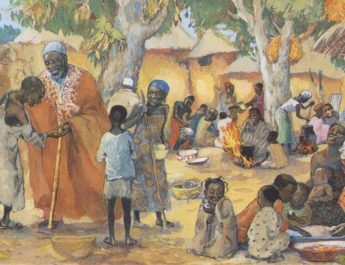Psalm 51:1-17
Ash Wednesday ABC
To the leader.I A PsalmII of David,III
I “leader” = natsach. Properly, something that glitters from a distance. So, something that stands out, excels, has status/standing (such as a chief musician or superintendent of Temple services). This can also mean to be permanent or enduring.
II “Psalm” = mizmor. From zamar (making music; used specially of music to worship God; music with singing, singing praise, singing psalms); may be from zamar (to trim or prune). This is a melody or a psalm.
III “David” = David. From the same as dod (beloved, love, uncle); the root may mean to boil, which is used figuratively to describe love. So, this implies someone you love such as a friend, a lover, or a close family member like an uncle. David’s name likely means something like “beloved one.”
when the prophetIV NathanV came to him, after he had gone in to Bathsheba.VI
IV “prophet” = nabi. This is prophet, prophecy, speaker, or someone inspired.
V “Nathan” = Natan. From natan (to give, put, set, offer; to give literally or figuratively). This is Nathan, meaning “given” or “[God] gives.”
VI “Bathsheba” = Bath-sheba. 11x in OT. From bath (daughter in a literal or figurative sense; can also be branch) {from ben (son literal or figurative; also, grandson, subject, nation); from banah (to build or obtain children)} + perhaps shaba (to swear, curse, vow, make a covenant; properly, to be complete; this is to seven oneself – as in affirming something so strongly it is as though it were said seven times) {perhaps from sheba (seven – the number of perfection/sacred fullness)}. This is Bathsheba, perhaps meaning “daughter of oath.”
1 Have mercy onVII me, O God,VIII
according to your steadfast love;IX
VII “have mercy on” = chanan. This is to beseech, show favor, be gracious. Properly, it is to bend in kindness to someone with less status.
VIII “God” = Elohim.
IX “steadfast love” = chesed. From chasad (being good, kind, merciful; may mean bowing one’s neck as is done in the presence of an equal for courtesy’s sake; so, if one in a superior position is treating you like an equal, that is what is captured here). This is favor, goodness, kindness, loving kindness, pity, reproach, or a good deed. When done by God to humanity, this is mercy/loving kindness. When done by humanity to God, it is piety.
according to your abundantX mercyXI
blot outXII my transgressions.XIII
X “abundant” = rob. From rabab (to be or become much or many, multiply). This is any kind of abundance.
XI “mercy” = racham. From the same as rechem (womb); from racham (to love, have compassion, have mercy); from racham (compassion, tender love, womb, compassion; the womb as that which cherishes the fetus). This is compassion, mercy, or tender love.
XII “blot out” = machah. This is to rub, which implies to erase. It can also be making something smooth with grease or oil. So, this could we wipe out, blot out, or destroy. Also, to touch or reach.
XIII “transgressions” = pesha. From pasha (to rebel, offend, quarrel; making a break from proper authority so can also refer to an apostate). This is transgression, rebellion, or sin. It could be a revolt on a national scale or an individual moral one.
2 WashXIV me thoroughlyXV from my iniquity,XVI
and cleanseXVII me from my sin.XVIII
XIV “wash” = kabas. This is to trample – washing by stomping feet. It can be fulling in a literal or figurative sense.
XV “thoroughly” = rabah. This is increasing in any aspect whether quantity, authority, size, quality, greatness, etc.
XVI “iniquity” = avon. Perhaps related to avah (to bend, twist, be amiss). This is sin, mischief, guilt, fault, punishment for iniquity, or moral evil.
XVII “cleanse” = taher. This is properly being bright, which implies being pure or clean. This word can also mean purge, cleanse, or purify. It can be clean in a ritual sense or a moral one (i.e. moral or holy).
XVIII “sin” = chatta’ah. From chata’ (to miss or go wrong and so to sin, bear the blame; it can also include the sense of forfeiting or lacking). This is sin itself as well as punishment for sin. It is sometimes used specifically to refer to sin that is habitual.
3 For I knowXIX my transgressions,
and my sin is everXX beforeXXI me.
XIX “know” = yada. This is to know, acknowledge, advise, answer, be aware, be acquainted with. Properly, this is to figure something out by seeing. It includes ideas of observation, recognition, and care about something. It can be used causatively for instruction, designation, and punishment.
XX “ever” = tamid. May come from a word that means to stretch. This word means an indefinite period of time. So, it could be regular or daily. It could also be constantly, continually, always, or perpetually.
XXI “before” = neged. From nagad (to declare, make conspicuous, stand in front, manifest, predict, explain). This is in front of, opposite to. It can refer to a counterpart or partner, one corresponding to or in the sight of.
4 Against you, you alone,XXII have I sinned,XXIII
and doneXXIV what is evilXXV in your sight,XXVI
XXII “alone” = bad. From badad (to divide or be separated; alone, solitary, lonely, isolated, straggler). This is apart, alone, separation, body part, tree branch, except. It can also be a city’s chief.
XXIII “sinned” = chata. Related to “sin” in v2. See note XVIII above.
XXIV “done” = asah. This is to make, do, act, appoint, become in many senses.
XXV “evil” = ra’. From ra’a’ (to be evil, bad, afflict; properly, to spoil – to destroy by breaking into pieces; figuratively, to cause something to be worthless; this is bad in a physical, social, or moral sense; that which displeases, to do harm or mischief, to punish or vex). This is bad, disagreeable, that which causes pain, misery, something having little or no value, something that is ethically bad, wicked, injury, calamity. This refers to anything that is not what it ought to be – a natural disaster, a disfigurement, an injury, a sin.
XXVI “sight” = ayin. This is eye in a literal or figurative sense so eye, appearance, favor, or a fountain (the eye of the landscape).
so that you are justifiedXXVII in your sentenceXXVIII
and blamelessXXIX when you pass judgment.XXX
XXVII “justified” = tsadeq. From tsedeq (rightness, righteousness, just cause, vindication; that which is right in a natural, moral, or legal sense; abstractly equity; figuratively prosperity). This is being just or righteousness. It refers to right in a moral or legal sense. So, it can be doing justice, clearing oneself, or turning to righteousness.
XXVIII “sentence” = dabar. This is generally to speak, answer, declare, or command. It might mean to arrange and so to speak in a figurative sense as arranging words.
XXIX “blameless” = zakah. 8x in OT. This is being clear or see through, so figuratively it means being innocent or blameless. It can also be clear, cleansed, justified, or pure.
XXX “pass judgment” = shaphat. This is to judge, defend, pronounce judgment, condemn, or govern. It can refer to God judging or to human judges. This is pronouncing a verdict in favor or against so it implies consequences or punishment. It can also mean to litigate or govern as one with authority.
5 Indeed,XXXI I was bornXXXII guilty,XXXIII
a sinnerXXXIV when my mother conceivedXXXV me.
XXXI “indeed” = hen. This is a remark of surprise or excitement: lo! Behold! It can also mean if or though.
XXXII “was born” = chul. This is whirling around so dancing as in a circle or writhing in pain. It is used particularly for the pain of childbirth or from writhing due to fear. It can also be falling in pain or waiting.
XXXIII “guilty” = avon. Same as “iniquity” in v2. See note XVI above.
XXXIV “sinner” = chet. Related to “sin” in v2 & “sinned” in v4. From chata (see note XVIII above). This is sin, fault, or punishment of sin.
XXXV “conceived” = yacham. 10x in OT. This is to be hot, mate. It is figuratively, to conceive.
6 XXXVIYou desireXXXVII truthXXXVIII in the inward being;XXXIX
XXXVI {untranslated} = hen. Same as “indeed” in v5. See note XXXI above.
XXXVII “desire” = chaphets. Properly, this means inclined towards or bending to. Figuratively, it means to desire, delight in, or be pleased with.
XXXVIII “truth” = emet. From aman (to believe, endure, fulfill, confirm, support, be faithful, put one’s trust in, be steadfast. Figuratively, this is to be firm, steadfast, or faithful, trusting, believing, being permanent, morally solid). This is firmness or stability. Figuratively, it is faithfulness, truth, or trustworthiness. This is the same root that “amen” comes from.
XXXIX “inward being” = tuchah. 2x in OT. From tuach (to smear or spread over, particularly to plaster or daub) OR from tachah (to shoot, stretch a bow). This is deepest, innermost parts or thoughts.
therefore teachXL me wisdomXLI in my secret heart.XLII
XL “teach” = yada. Same as “know” in v3. See note XIX above. Here, it is Hifil, which is causative (i.e. “make me to know”).
XLI “wisdom” = chokmah. From chakam (to be wise or teach wisdom; this is wisdom in thought, word, or action). This is wisdom, wit, or skillfulness.
XLII “secret heart” = satham. 15x in OT. This is closed, stopped up, or shut up. This can imply repairs or figuratively it can mean keeping secret.
7 PurgeXLIII me with hyssop, and I shall be clean;XLIV
wash me, and I shall be whiter than snow.XLV
8 Let me hearXLVI joyXLVII and gladness;XLVIII
XLVI “hear” = shama. This is to hear, call, consent, or consider. It implies listening intelligently, giving attention, and, because of these two factors, obedience and action are often implied.
XLVII “joy” = sason. From sus (to rejoice, be glad; properly, to be bright or cheerful). This is rejoicing, cheerfulness, and welcome.
XLVIII “gladness” = simchah. From samach (to rejoice, be glad; properly, to brighten up; also used figuratively). This is joy, rejoicing, pleasure, or glee.
let the bonesXLIX that you have crushedL rejoice.LI
XLIX “bones” = etsem. From atsam (vast, numerous, strong; to close one’s eyes, to make powerful; to break bones). This is self, life, strength, bone, or substance.
L “crushed” = dakah. 5x in OT. This is to crush or break. It is collapse whether in the body or in the mind. It can also mean to crouch or be contrite.
LI “rejoice” = gil. Properly, this is twirling around because of a strong feeling whether of rejoicing or from fear. This can be rejoice, be glad or joyful, or to cry.
9 HideLII your faceLIII from my sins,LIV
and blot out all my iniquities.
LII “hide” = sathar. This is hide, conceal, or be absent. It is hiding because something is covered – used in a literal or figurative sense.
LIII “face” = paneh. From panah (to turn, face, appear). This is face in a literal or figurative sense. It could be face, presence, anger, respect. It can also be used of God to indicate divine favor or presence.
LIV “sins” = chet. Same as “sinner” in v5. See note XXXIV above.
10 CreateLV in me a cleanLVI heart,LVII O God,
LV “create” = bara. This is to create, shape, choose, or select. It is the word used in Genesis 1:1 when God created the heavens and the earth.
LVI “clean” = tahor. Related to “cleanse” in v2. From taher (see note XVII above). This is clean or pure in a literal, ritual, or ethical sense.
LVII “heart” = leb. May be related to labab (to encourage; properly, to be encased as with fat; used in a good sense, this means to transport someone with love; used in a bad sense, it can mean to dull one’s senses). This is the heart, courage, one’s inner self, the mind, or the will. Heart is only used in a figurative sense in the Old and New Testaments.
and put a newLVIII and rightLIX spiritLX withinLXI me.
LVIII “put a new” = chadash. 10x in OT. This is to renew or restore, to repair or rebuild.
LIX “right” = kun. Properly, this means in a perpendicular position. So, it is set up in a literal sense – establish, fix, fasten, prepare. In a figurative sense, it is certainty, to be firm, faithfulness, render sure or prosperous.
LX “spirit” = ruach. This is breath, wind, air, cool, spirit. This is wind, which resembles the breath and so this can be used figuratively for life itself or being frail/mortal/impermanent. It can refer to the air of the sky or the spirit.
LXI “within” = qereb. Perhaps from qarab (to come near or approach). This is among, in the midst, before, the center It is the inward part, whether literal or figurative. It can also be used for the heart, the site of thoughts and feelings. This word is also used as a technical term for the entrails of the animals who are sacrificed.
11 Do not cast me awayLXII from your presence,LXIII
and do not takeLXIV your holyLXV spirit from me.
LXII “cast…away” = shalak. This is to throw, fling, or hurl. It can also be to throw away in a literal or figurative sense.
LXIII “presence” = paneh. Same as “face” in v9. See note LIII above.
LXIV “take” = laqach. This is to take, accept, carry away, receive.
LXV “holy” = qodesh. This is set apart and so sacred. God is different from us and so God is holy/set apart. Things we dedicate to God’s service are set apart for God and so they, too, are holy, etc.
12 RestoreLXVI to me the joy of your salvation,LXVII
and sustainLXVIII in me a willingLXIX spirit.
LXVI “restore” = shub. To turn back, return, turn away – literally or figuratively. Doesn’t necessarily imply going back to where you started from. This is also the root verb for the Hebrew word for repentance “teshubah.”
LXVII “salvation” = yesha. From yasha (to deliver, defend, help, preserve, rescue, be safe. Properly, to be open, wide or free, which implies being safe. Used causatively, it means to free). This is salvation, deliverance, rescue, safety, welfare, liberty.
LXVIII “sustain” = samak. This is to lean, rest, support, brace, uphold, sustain, or establish. It is to lean on in a positive or negative sense.
LXIX “willing” = nadib. From nadab (to offer willingly, volunteer, freely give, be willing). Properly, this is voluntary and so it implies generous, noble, magnanimous, or a generous person.
13 Then I will teachLXX transgressorsLXXI your ways,LXXII
and sinnersLXXIII will returnLXXIV to you.
LXX “teach” = lamad. Properly, this refers to goading (using a pointed stick to guide or prod one’s flock). By implication, it means teaching or instructing.
LXXI “transgressors” = pasha. Related to “transgressions” in v1. See note XIII above.
LXXII “ways” = derek. From darak (to tread, march, to walk. Can also mean affixing a string to a box since one needs to step on it to bend it in the process; so also an archer). This is a road as a thing that is walked on. Can be used figuratively for the path that one’s life takes or how one chooses to live one’s life.
LXXIII “sinners” = chatta. Related to “sin” in v2 & “sinned” in v4 & “sinner” in v5. 19x in OT. From chata (see note XVIII above). This is sinful or sinner. It is a criminal or someone who is seen as guilty.
LXXIV “return” = shub. Same as “restore” in v12. See note LXVI above.
14 DeliverLXXV me from bloodshed,LXXVI O God,
O God of my salvation,LXXVII
LXXV “deliver” = natsal. This is to snatch someone or something away in a good sense – as rescue, defend, or deliver – or in a bad sense – as strip or plunder.
LXXVI “bloodshed” = dam. Perhaps from damam (to cease, be or become mute, silent, still, cut off, hold peace, be astonished, die). This is blood, bloodshed, bloodguilt, lifeblood, and death. It is used for people and animals. More often blood from a wound or the blood of the innocent. Used figuratively for violence or for wine. Closely tied to life and death.
LXXVII “salvation” = teshua. Related to “salvation” in v12. From yasha (see note LXVII above). This is deliverance or salvation.
and my tongueLXXVIII will sing aloudLXXIX of your deliverance.LXXX
LXXVIII “tongue” = lashon. This is tongue, talker, language, or wedge. It can also be a tongue of flame or a water cove.
LXXIX “sing aloud” = ranan. This is a cry of joy or a joyful song. Properly, it is emitting a shrill sound, especially one of joy.
LXXX “deliverance” = tsedeqah. Related to “justified” in v4. From the same as tsedeq (see note XXVII above). This is righteousness, justice, righteous acts, and moral virtue.
15 O Lord,LXXXI openLXXXII my lips,LXXXIII
LXXXI “Lord” = Adonai. From adon (lord, master, owner); root means to rule or be sovereign. This is the actual Hebrew word for Lord used (in a different form) of humans and (in the present form) of God. It means someone who is in control.
LXXXII “open” = pathach. This is to open wide in a literal or figurative sense. So, it is open, draw out, let something go free, break forth. It can also mean to plow, engrave, or carve.
LXXXIII “lips” = saphah. This is lip, edge border, bank – used for a boundary. It can also be speech or language.
and my mouthLXXXIV will declareLXXXV your praise.LXXXVI
LXXXIV “mouth” = peh. This is mouth in a literal or figurative sense. So, more literally, it can be beak or jaws. More figuratively, it refers to speech, commands, or promises.
LXXXV “declare” = nagad. Related to “before” in v3. See note XXI above.
LXXXVI “praise” = tehillah. From halal (to praise, be boastful). This is praise or a song of praise. It is to offer God a hymn, to boast in God. This shares a root with “hallelujah.”
16 For you have no delightLXXXVII in sacrifice;LXXXVIII
if I were to give a burnt offering,LXXXIX you would not be pleased.XC
LXXXVII “have…delight” = chaphets Same as “desire” in v6. See note XXXVII above.
LXXXVIII “sacrifice” = zebach. From zabach (to kill, slay, offer; slaughtering an animal to offer as a sacrifice). This is a slaughter – literally of an animal. So, it implies the act or the animals used in sacrifice. Further, it can mean offering.
LXXXIX “burnt offering” = olah. From alah (to go up, climb, approach, bring; to be high or actively climb; can be literal or figurative). This is a step, stairs, or some kind of ascent. It is also used for whole burnt offerings, being the offering in which the whole things is burned and rises as smoke. Burnt offerings were the least common of the offerings: most were eaten, shared with the priest and the one bringing the offering.
XC “be pleased” = ratsah. This is to be pleased with, delight, take pleasure in, or accept with favor. It can mean to approve or consent regarding something. It can also be used specifically of satisfying debts or being pardoned.
17 The sacrifice acceptable to God is a brokenXCI spirit;
a broken and contriteXCII heart, O God, you will not despise.XCIII
Image credit: “Water Drop” by Allan Foster, 2009.




